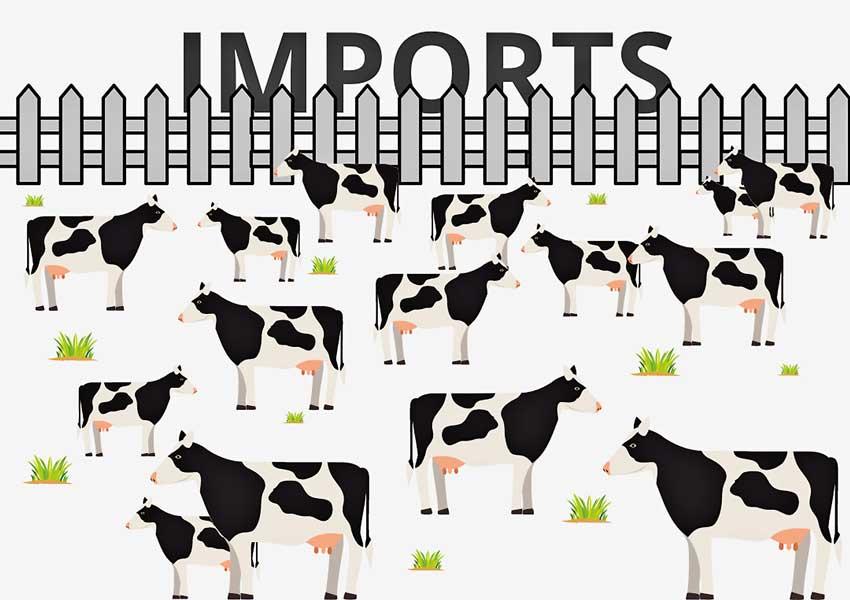07 Jul 2020 - {{hitsCtrl.values.hits}}

 As the COVID-19 virus forced much of the world into lockdown, the scale of interdependence and reliance on trade across nations was apparent by the global urgency to re-open economies as soon as possible.
As the COVID-19 virus forced much of the world into lockdown, the scale of interdependence and reliance on trade across nations was apparent by the global urgency to re-open economies as soon as possible.
The shortage of goods and loss of income experienced due to the disruption of supply chains helped some nations realize that a country typically stands to lose more than it may gain by being shut out from the global market. Sri Lanka continually increasing import controls and locking itself out of trading networks then begs the question, why are we punishing ourselves?
A common justification in people’s minds may be that difficult times call for difficult measures; curbing imports may seem inevitable amidst the current health crisis caused by a contagious virus and the financial threat of a depreciating currency.
Political motives
However, as elections are approaching, it appears these decisions are primarily driven by political and not economic motives. Given that Sri Lanka’s exchange rate became a key campaign topic in the last election, the current rise in import controls seems to be an attempt at artificially maintaining a “strong” currency prior to elections after the excessive money-printing in March this year.
Furthermore, such decisions should also be recognised as far more than precautionary policies due to the pandemic, and rather, a projection of the national tendency to revert to protectionism.
The ban placed on maize imports in mid-January (prior to the when the first case of coronavirus was reported in Sri Lanka) indicates this predisposition. Sri Lanka exhibits a recurrent desire - often fueled by nationalistic rhetoric - to boost domestic production or even become self sufficient across various sectors and industries, sometimes in complete ignorance of comparative advantage and practicalities. This is evidenced in the aftermath of importing 5,000 milk cows in order to boost local dairy production in 2017 which led to many farmers accruing debt whilst over 400 cows died due to poor living conditions.
Not only did it result in Sri Lanka still importing; this method was more expensive because now money had to be spent to feed and care for the cows in the absence of their natural habitat.
Despite this result, the new government again approved a proposal to import 2,500 cattle from Australia on the 1st of June this year in the hope of curbing milk product imports to Sri Lanka.
In the case of import controls and such protectionist actions, problems tend to manifest regardless of the intentions behind the implementation of such policies. For example, the maize embargo which was imposed with the intent of accelerating domestic production and protecting local farmers has led to several adversities - now including a shortage of supply. It is important to note that the brunt of the outcome was faced by a vulnerable stakeholder that the government aims to protect: small-scale poultry farmers.
As the main consumers of maize (because it is needed for chicken feed), poultry farmers were initially forced to pay higher prices to obtain maize and were at the mercy of Sri Lanka’s oligopoly of grain collectors.
The problem was exacerbated as domestic stocks of maize withered away and suppliers could not import to fill the deficit. According to the Export Development Board, Sri Lanka imported 102,461.175 metric tonnes of maize in 2019 despite domestic production for the year being at
245,647 metric tonnes.
This clearly reflects that the local demand for maize is far greater than the domestic capacity for maize production. Another example of unintended consequences can be extracted from the confectionary industry which recently expressed concern regarding the inability to access imported raw materials that are necessary for cost-effective local production. The 340 percent special commodity levy on block fat and margarine imports which was introduced this month has led to significant strain and job-insecurity within the industry.
Saubhagya Dekma
The new administration recently reiterated their pledge made under the ‘Saubhagya Dekma’ policy statement of turning Sri Lanka into a “people-centric production economy”.
Despite his claim that limiting imports has “paved the way” for a production economy it is necessary to understand that even most local businesses require imported materials in order to produce. The latest statistics from the World Bank indicate that 38.19 percent of our total merchandise imports are intermediate goods that are used locally as inputs for production. Regardless of our ambitions, Sri Lanka’s economy requires imports for growth. Many of our consumables are imported and local businesses, including key exporters such as the textile industry, use imported raw materials. Curbing imports will impede the ability of local businesses to cost-effectively grow.
Economic instability
If the government fails to readjust its policy on import controls and continues down the path of increasing protectionism post Covid-19, Sri Lanka may continue to face economic instability and revenue loss within the sectors that are affected by these constraints. Ultimately, despite the rhetoric and propaganda of ‘saving local businesses’ and creating a brand of ‘made in Sri Lanka’ that enamours the public during political campaigns, it is often the most vulnerable within local businesses that stand to lose the most from the enactment of protectionist policies.
As poultry farmers struggle to maintain their income and employees within the confectionery industry remain anxious about the status of their jobs, the question remains: why are we punishing ourselves?
(Erandi de Silva is a Research Intern at the Advocata Institute, and can be contacted at [email protected] and @randyyrando on twitter. The opinions expressed are the author’s own views. They may not necessarily reflect the views of the Advocata Institute, or anyone affiliated with the institute.)
25 Dec 2024 2 hours ago
25 Dec 2024 3 hours ago
25 Dec 2024 4 hours ago
25 Dec 2024 4 hours ago
25 Dec 2024 5 hours ago